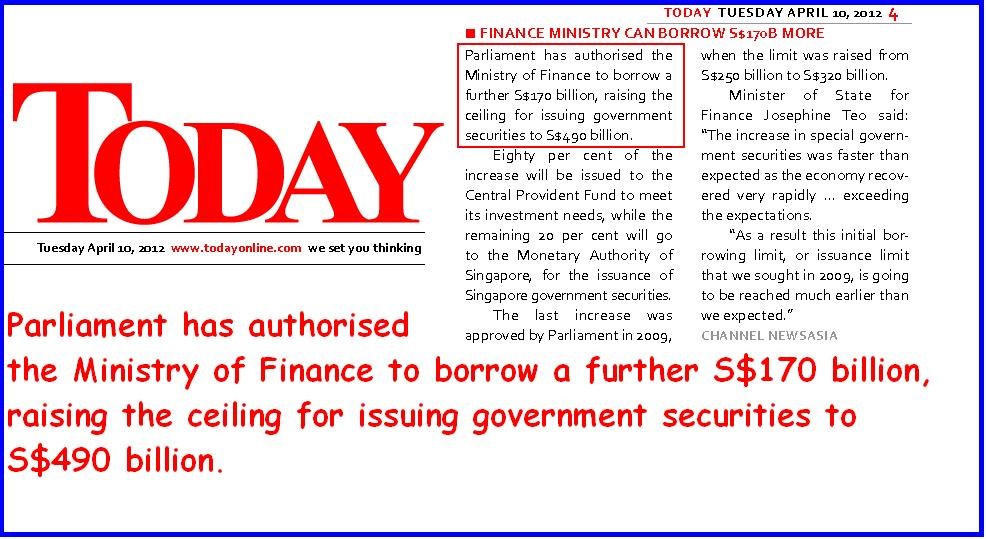'Interest rate' solution to property price inflation- an illusion/ systematic deception?
Firstly, the general definition of inflation is "The rate at which the general level of prices for goods and services is rising, and, subsequently, purchasing power is falling." [source: investopedia].
Singapore is understood to be using currency exchange (a strengthening Sing dollar) as its main means to combat inflation. ('Singdollar tipped to rise further' [ST,12Apr2012]
In his letter to the Straits Times: 'Use interest rates to control inflation' [ST, 14Apr2012], Mr Yeo Chee Kean mentioned: "However, over the last 10 years, .. inflation is becoming more of a result of a mismatch in domestic supply and demand. This is better addressed with managing interest rates than exchange rates."
Please note that in this article, I'd like to use the term 'inflation' more loosely than typical in the academia of economics: that of simply an 'increase'. As such, for the avoidance of doubt, readers are advised to be careful about the context in which I use the term 'inflation'.
What Mr Yeo CK is advocating is not without precedent. Mr Paul Volcker, as then Chairman of the Federal Reserve, raised the federal funds rate to 20% in June 1981 as his prescription for double digit inflation plaguing the then US economy.
According to Yahoo answers: 'Why do the government use interest rates to control inflation?' [link]: "The theory is that a rise in interest rates, and the corresponding limitation in money supply, will 'damp down' excess demand and 'take the pressure out of market'. The intention is to reduce households' and firms' willingness to buy goods and services through making credit more expensive."
One interesting fact is that the cost of credit does not factor as part of the 'basket of goods' which determines the consumer price index (CPI) (at least not in Singapore)- thus the government can easily 'inflate' the interest rate without such 'inflation' being revealed in the CPI although it is estimated that many people will certainly be affected by this fact- higher installments on ALL goods bought using loans. Increase in interest rates thus doesn't mean reduced inflation- it merely means 'unrecorded' inflation in some circumstances, although the next point is much more significant.
The second and I think bigger point is that governments world over are in much too much debt [read debt crisis] in the context of Singapore, the government has already borrowed S$320billion, with Parliament recently endorsing another S$170B more: 'Finance Ministry (MOF) can borrow S$170b more' [TDY, 10Apr2012][pict]. Imagine, if the MOF increased the rate at which it lent money to banks, wouldn't the MOF also in return suffer having to pay higher coupon rates upon its soon to be S$490B debt?- without increased govt income from either tax or investment, money printed to repay interest would simply be routed to CPI inflation etc.
(As a side point, the low interest rates help businesses which in turn raise the GDP- a shrinking GDP places a government in bad light and makes its debt cost higher- thus the interest rates on Spanish bonds being around 7%- a syndrome of a government in economic duress).
Any use of 'inflation' (increase) in interest rates is thus NOT a sustainable means towards lowering inflation but merely a
temporary means of reducing measurable inflation by channeling it elsewhere, so that it cannot be detected nor recorded by the usual means (i.e. CPI records).
Why penalize the poor (who need to borrow to survive) whilst penalizing property speculators?
Perhaps the better way to control property prices is through increased property taxes with a stipend given to every citizen for the purpose of relief (e.g. citizenship rebate) on other necessary living costs such as property rent/ tax, transport, medical/ educational costs etc. Such a means of taxation would then curb high property prices and reward those who are able to use space more efficaciously (some poor people living in cramped quarters can use the $$$ for lodging, food and education etc).
There are many rich Singaporeans in Singapore (and the world), for a more cohesive society, these rich Singaporeans (in leadership positions) should be encouraged to help their poorer brethren (affected by inflation) rather than inventing more spurious schemes of usury that make the rich richer and the poor poorer in small and land scarce Singapore.

 [Caption: 'YOUNG KID .....ALREADY BILLIONAIRE'][Source: Hyperinflation In Zimbabwe..]
[Caption: 'YOUNG KID .....ALREADY BILLIONAIRE'][Source: Hyperinflation In Zimbabwe..]
Firstly, the general definition of inflation is "The rate at which the general level of prices for goods and services is rising, and, subsequently, purchasing power is falling." [source: investopedia].
Singapore is understood to be using currency exchange (a strengthening Sing dollar) as its main means to combat inflation. ('Singdollar tipped to rise further' [ST,12Apr2012]
In his letter to the Straits Times: 'Use interest rates to control inflation' [ST, 14Apr2012], Mr Yeo Chee Kean mentioned: "However, over the last 10 years, .. inflation is becoming more of a result of a mismatch in domestic supply and demand. This is better addressed with managing interest rates than exchange rates."
Please note that in this article, I'd like to use the term 'inflation' more loosely than typical in the academia of economics: that of simply an 'increase'. As such, for the avoidance of doubt, readers are advised to be careful about the context in which I use the term 'inflation'.
What Mr Yeo CK is advocating is not without precedent. Mr Paul Volcker, as then Chairman of the Federal Reserve, raised the federal funds rate to 20% in June 1981 as his prescription for double digit inflation plaguing the then US economy.
According to Yahoo answers: 'Why do the government use interest rates to control inflation?' [link]: "The theory is that a rise in interest rates, and the corresponding limitation in money supply, will 'damp down' excess demand and 'take the pressure out of market'. The intention is to reduce households' and firms' willingness to buy goods and services through making credit more expensive."
One interesting fact is that the cost of credit does not factor as part of the 'basket of goods' which determines the consumer price index (CPI) (at least not in Singapore)- thus the government can easily 'inflate' the interest rate without such 'inflation' being revealed in the CPI although it is estimated that many people will certainly be affected by this fact- higher installments on ALL goods bought using loans. Increase in interest rates thus doesn't mean reduced inflation- it merely means 'unrecorded' inflation in some circumstances, although the next point is much more significant.
The second and I think bigger point is that governments world over are in much too much debt [read debt crisis] in the context of Singapore, the government has already borrowed S$320billion, with Parliament recently endorsing another S$170B more: 'Finance Ministry (MOF) can borrow S$170b more' [TDY, 10Apr2012][pict]. Imagine, if the MOF increased the rate at which it lent money to banks, wouldn't the MOF also in return suffer having to pay higher coupon rates upon its soon to be S$490B debt?- without increased govt income from either tax or investment, money printed to repay interest would simply be routed to CPI inflation etc.
(As a side point, the low interest rates help businesses which in turn raise the GDP- a shrinking GDP places a government in bad light and makes its debt cost higher- thus the interest rates on Spanish bonds being around 7%- a syndrome of a government in economic duress).
Any use of 'inflation' (increase) in interest rates is thus NOT a sustainable means towards lowering inflation but merely a
temporary means of reducing measurable inflation by channeling it elsewhere, so that it cannot be detected nor recorded by the usual means (i.e. CPI records).
Why penalize the poor (who need to borrow to survive) whilst penalizing property speculators?
Perhaps the better way to control property prices is through increased property taxes with a stipend given to every citizen for the purpose of relief (e.g. citizenship rebate) on other necessary living costs such as property rent/ tax, transport, medical/ educational costs etc. Such a means of taxation would then curb high property prices and reward those who are able to use space more efficaciously (some poor people living in cramped quarters can use the $$$ for lodging, food and education etc).
There are many rich Singaporeans in Singapore (and the world), for a more cohesive society, these rich Singaporeans (in leadership positions) should be encouraged to help their poorer brethren (affected by inflation) rather than inventing more spurious schemes of usury that make the rich richer and the poor poorer in small and land scarce Singapore.


